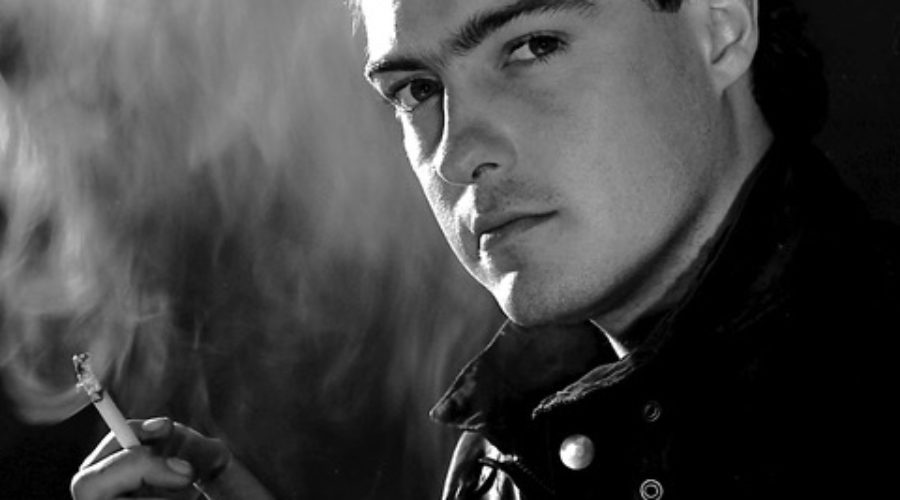Random Lines: The Accidental Death of an Idealist
If there’s one problem with philanthropy, it is that one’s good trust in humanity is constantly being attacked by miserable reality.
Most folk discard the whole concept of human good from an early age, after some harrowing encounter such as having a favourite teddy bear stolen by the big kids next door, or after crawling home from one’s first playground bashing. Those whose big-hearted human warmth survives such erosive incidents usually find the thing quashed upon being drafted into primary school. Indeed, if you haven’t lost all trust in humanity by the end of grade one, then you can realistically write off any aspirations of becoming a lawyer, a doctor, a successful businessman, or a Prime Minister of Australia. In fact your future options are pretty skint; careers in philanthropy are no big number.
Those who persist with its blind idealism are idiots, drug casualties, impoverished writers, New Zealanders, or combinations of the same. Philanthropists have little hope in a sick, twisted world such as this.
For years, I’m ashamed to admit, I grossly overestimated human potential. For years I’d wished the best for mankind, blindly ignoring the madness, mayhem, and depravity that appeared daily in the newspapers. Such was my concern for the quality of individual human existence and mankind as a whole, that I actually devised a ploy that might orchestrate its salvation: it was my deepest heartfelt wish for each individual to discover and ride motorcycles.
But suddenly this lofty idealism came crashing down. I’d gone trail riding with an old friend on a test bike, and I think it was the awful sight of Peter cartwheeling the borrowed bike down an impossibly steep, muddy slope into a boghole that triggered my demise as a philanthropist. Some people are just not built for motorcycles – that’s the plain truth of it.
From the moment this idea took seed, my trust in human potential began to crumble, my hope for the two-wheeled salvation of humanity began to crack, and instead of centring itself upon idealistic, egalitarian concerns, my outlook became increasingly bleak, cynical, and hopeless. I was well on the road to becoming an impoverished writer, but this was small recompense for the devastating knowledge that motorcycling could not save the world.
At first I hoped it was just a misunderstanding, but evidence kept mounting; it began to put the matter beyond reasonable doubt.
Peter proved a recurrent example of how not to go about riding motorcycles, and also of how people who should not be riding motorcycles can have the insidious effect of dragging others down to their awkward level. Peter and I did the long ride together through childhood, adolescence, and formative motorcycle experiences. I lost track of him a couple of years back, but the word is he’s engaged in some esoteric quest for spiritual development. Bloody ironic, I reckon, but perhaps explainable in view of the sheer number of close shaves with fragile mortality he’d gone through on bikes.
Looking back on it, Pete had displayed clear signs of motorcycle incompatibility from the time of our first bikes. Take the time we’d just rebuilt our Bultaco Pursang 250. Resplendent with its neat new paintwork, and rebuilt to as-new condition, the bike was wheeled proudly onto the street for the first fire-up. After 50 metres of my pushing, Peter got the motor sparking and blurted down the road a bit before stopping to warm the engine. He was about ten metres ahead of me, trying to change from first to neutral, when I caught sight of a fast-moving crazed dog.
Too late. The rotten animal leapt at him, sinking its fangs into Peter’s leg. In shock Pete dumped the clutch. The bike lurched upward in a terrible wheelstand. Peter clung on helplessly, valiantly taking most of the fall as the bike flipped onto the asphalt, smashing both freshly painted fibreglass guards and denting the tank. Not really Peter’s fault, but typical of the kind of thing one could expect when riding with him.
Peter had the sense to avoid road bikes for the most part, with good reason. Once, when I had a new first-model GSX1100 Suzuki to run-in before testing, I offered Peter my old Yamaha so we could both enjoy a nice, casual jaunt in the Adelaide Hills. Unfortunately, a bunch of psychotic Honda CBX1000 and CB900 riders appeared from the undergrowth along Lobethal Road, and by the graphic and evocative nature of their hand gestures, I gathered they wished to pitch their madness against mine. After a time of this I backed off and waited until Peter caught up, and we rode together at a nice, relaxed pace.
Passing the next town, however, the Hondas were panting for another bash at the GSX along the tighter reaches of the Gorge Road. Peter must have noticed the maddened throng looming in his rear-vision mirror. Keen to establish his position at the head of this intimidating crowd, he promptly panicked. I watched from behind in horror and disbelief as he peeled into a hairpin like it was a sweeper, charging wildly towards two oncoming cars and a trail bike.
One car savagely veered left to an expensive halt around a guardrail; Peter clipped the back bumper of the second car with his brake lever, foot, and footpeg; and the trail bike crashed for apparently no reason other than stark terror of the sight ahead. Despite hitting the car Peter did a fine job of keeping the Yamaha upright. It could have been worse, I’d thought. Then, as he stopped, his foot collapsed in pain beneath him (broken bones) and the bike toppled upon him in an untidy heap. Ouch.
Unlike motorcycling generally (which has been portrayed as the macho hero trip for so long that perhaps we even believe it), the actual requirements of being a successful motorcyclist do not discriminate on grounds of sex. Deb, for example, was a skilled and dauntingly quick rider, but in hindsight was one of those people who should have bought a TZ and have given large road bikes a wide berth. Her height was the problem. It was okay when she rode RDs with TZ-type seats, but not even cut-down padding could help her touch ground on her R75 BMW. To get one foot down at stoplights, Deb found it necessary to run both tyres at a deflated 10 psi! In order to control the BMW’s fierce wobbling (made even worse by the tyre pressures), Deb had fit huge, wide motocross bars for extra leverage. These improved things on racer road, but around town the wide bars simply allowed her to run into more trouble.
One day she and Jenny were charging through stationary traffic lanes when the monster bars unwittingly ripped a rear vision mirror from its car door. A persistent thumping on Deb’s shoulder suggested that Jen might appreciate a drop in pace, but as they struggled to a halt at the lights it became clear that Jen, too, was the sort of person who’d be best advised to avoid contact with motorcycles.
“You busted that person’s mirror off!” she scowled. “Aren’t you going to stop and say sorry?”
Apart from running the risk of doing themselves harm, folk who persist with motorcycles despite a seemingly natural incompatibility do nothing to improve the standing of motorcycling as a serious and valid pursuit in the jaded eyes of the ugly public. Indeed, often the opposite. Deb, for instance, was riding home from the dentist one afternoon, her face still numb and puffy from the local. It was a nice day, pleasant Adelaide sunshine and all, and she happily gave what she thought was a rather sweet smile to a carload of lawn bowlers in a light tan Holden Sunbird.
Rather than returning her good sentiment the blue-rinse brigade stared back at Deb with fear and horror. It was only later, when removing her helmet at home, that Deb noticed the quantity of dried blood that had dribbled from her mouth, covering her face and the front of her white windcheater.
Even after consideration of these disturbing cases, some hope that motorcycling might be the answer lingered on. My idealism didn’t snuff it until old Hugh presented glaring evidence that some people, for reasons of philanthropic concern, should have nothing to do with motorcycles.
Hugh was clearly not designed to ride motorcycles. On the rare occasions he was sober, Hugh was the sort of bloke you’d introduce to your Mum — if she were available. Unfortunately, most of Hugh’s waking hours (and all of his sleeping hours) were conducted with a bloodstream approximating Hunter S. Thompson’s.
We worked together and shared squalor close to town for a year, and the thing I regret about it was ever mentioning that I’d heard about the RD400 going cheap. It was a nightmare from start to finish, the whole Hugh/RD saga. Hugh, you see, had a rather sound minimalist attitude to material possessions, if only because all his funds were deployed in the urgent areas of drugs and booze. So far as tooling up for his new bike was concerned, Hugh maintained indifference: he certainly wasn’t going to be accused of owning a screwdriver!
He’d owned a two-stroke before, so I figured he had some idea of basic bike maintenance, but when the motor blew after three months’ service, it apparently came as some surprise that the two-stroke oil tank actually needed oil in it. To this day he maintains, “I bought that bike from a robber!”
If that wasn’t enough, the real indication of what I’d been sharing a hovel with appeared with hideous clarity when Hugh began planning a trip through the Red Centre, up to Darwin. He figured his bald tyres wouldn’t last the distance, but seeing as new tyres were so expensive and would only get worn on a trip like that, he’d decided he’d ask for retreads to make it cheaper!
Good, basic ignorance seemed to surround Hugh’s ill-fated time with bikes; his helmet was a good example. Some brickheads rip the linings out of their helmets, but Hugh’s had already rotted out by the time he bought the helmet with the bike. The side padding dangled around somewhere under the chin, the shell was scratched and cracked, and the thing reeked of stale beer, ganja breath and dried vomit. So I got to learn a bit about RD maintenance.
Once, in a fit of sarcasm, I covered the Yamaha tank decals with two larger red/white/blue Honda ones. It took a few weeks for Hugh to notice; he left them there.
One night the inevitable happened. Apparently he misjudged the location of the roundabout a couple of blocks from home while returning from some heavy session miles away. He spent a few days in hospital – a few cuts but no breaks – but he registered terminal on the blood test. The subsequent loss of licence wasn’t quite the blow it might have been, for Hugh had already come to the conclusion that motor vehicles and his lifestyle didn’t mix.
But talk about panic begetting panic: I was checking the damage after Hugh’s crash, chasing up the bike and so forth, when I discovered that the RD (dropped 100 metres from home) had been towed two miles away and would be released only for a shameful sum; and that the officiating policeman, in his panic, had reported the brand of the bike from the stickers on the tank: Honda.
After our lease ran out we went our separate ways. The last time I saw Hugh he was still at it, full-on wasting but getting around on a pushbike, which was a lot more his style. I arrived home early one morning to find Hugh must have paid a visit. Everyone in the house was asleep, but the Ducati’s noise must have shaken Hugh from his slumber in the armchair. The kitchen table was piled with empties, a burned-out rollie dangled from the corner of his mouth, a pint glass of stale stout teetered on the arm of the chair, while noise blared from the TV set, and Hugh mumbled something unintelligible as I rolled a smoke.
Eventually he collected a spilled bag from the coffee table and staggered blindly towards his bicycle. How he managed to ride the thing home, God (if there is one, and even if there isn’t…) only knows. The image of Hugh wobbling off into the night is a haunting reminder, a stark vision of how thoroughly this sodden writer’s idealism has been shattered.
Perhaps this might provide a glimpse of why, with all hope for humanity’s salvation through motorcycling forever lost, my idealism has given way to a valid, if totally impossible, new philosophy: that people should take responsibility for their own lives. It seems as good a philosophy as any, and it should last at least until I’m forced to make a decision.
By Jeff Fereday. Two Wheels, June 1985
Copyright: Estate of Jeff Fereday.
In 2013, Jeff’s wife Susan published the complete collection of Random Lines in a book of the same name. Priced at $35, you can order a copy here.





